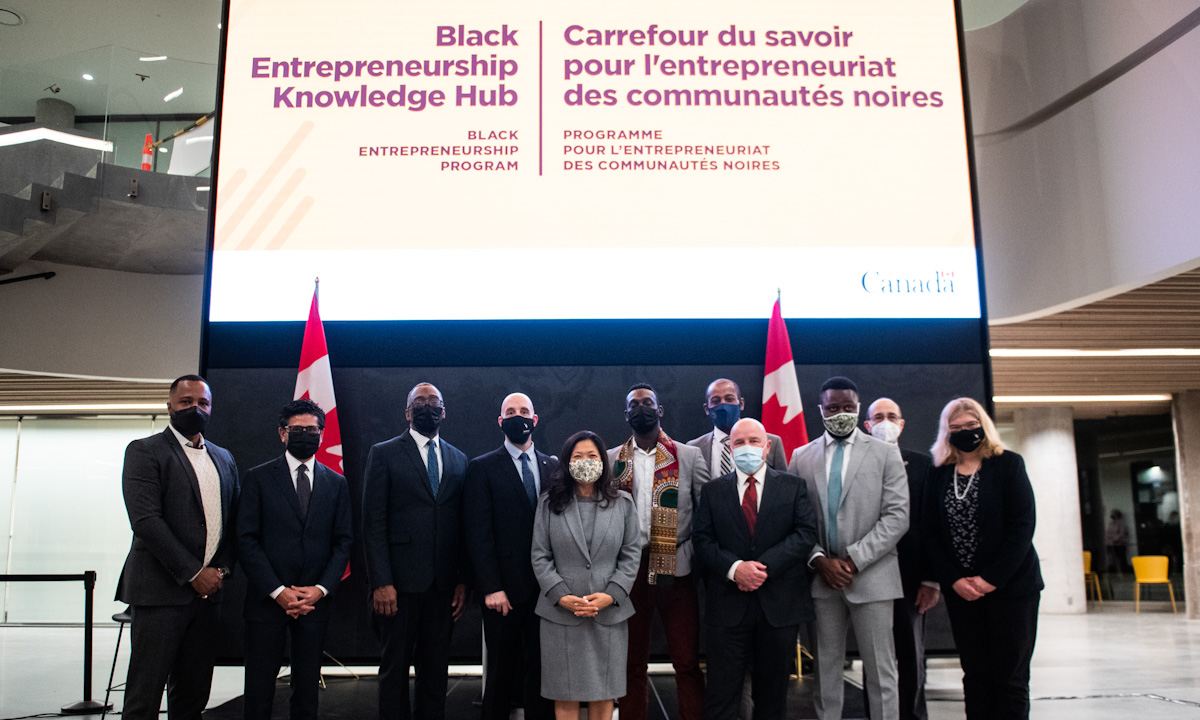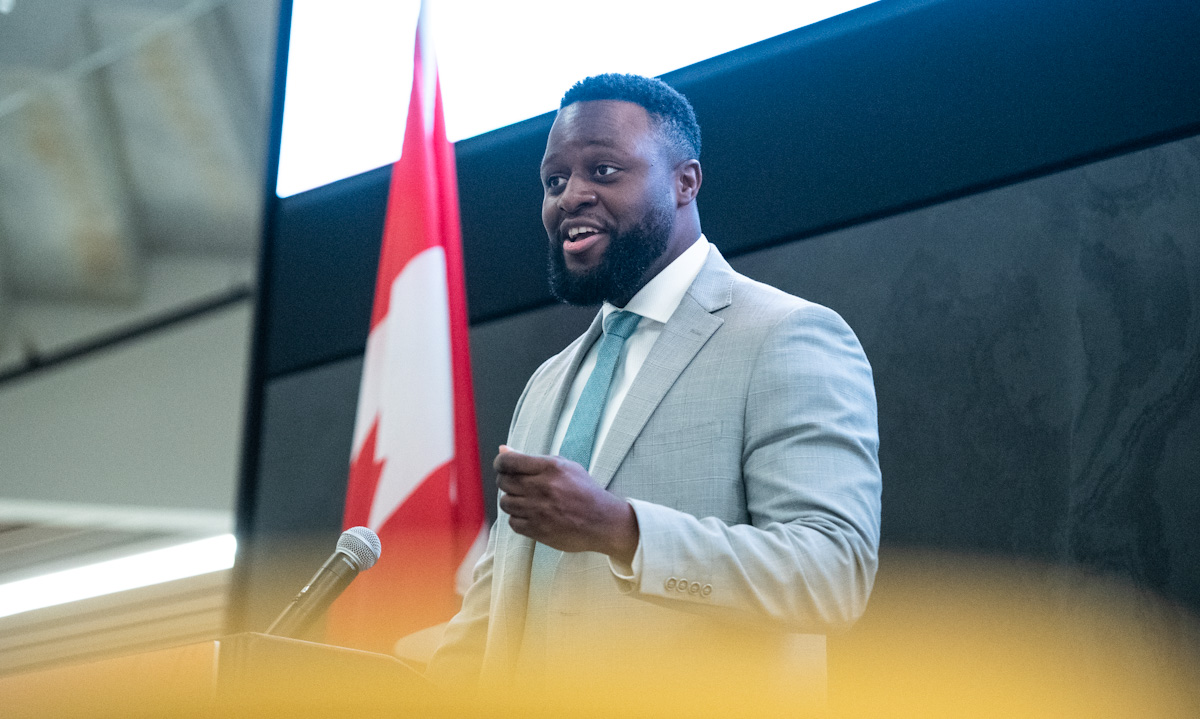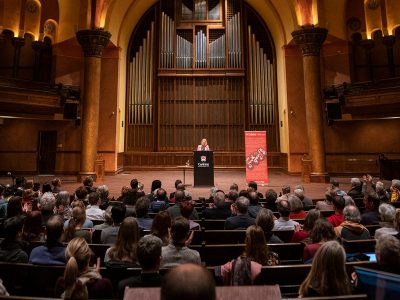Photos by Justin Tang
Black entrepreneurship has always been a vital part of Canada’s economy, but large-scale, detailed research and pan-Canadian information on it has been limited. This knowledge and sharing of lived experiences has a vital role in informing the public policies that are needed to address the systemic barriers Black entrepreneurs face when building their businesses.
“While Black entrepreneurs have been—and are—pillars of our communities, we have limited knowledge and information about the existence, size and scope of Black entrepreneurship in Canada,” said Information Systems Professor Gerald Grant, director of the Centre for Information Technology, Organizations, and People (CITOP) at Carleton’s Sprott School of Business.
“The Black Entrepreneurship Knowledge Hub will change that.”
In partnership with the Dream Legacy Foundation, the Black Entrepreneurship Knowledge Hub (BEKH) will be a national data and knowledge platform focusing on the state of Black entrepreneurship in Canada. It will be centred at the Innovation Hub at the Sprott School of Business, alongside five regional hubs across the nation. Its community-focused research and knowledge mobilization activities will conduct research and identify barriers to success to ultimately help Black entrepreneurs across Canada grow their businesses to the fullest potential.

Professor Gerald Grant
BEKH at Carleton
Grant and Prof. Rick Colbourne, assistant dean of Equity and Inclusive Communities at Sprott, are co-leading the establishment of BEKH at Carleton.
To put this plan into action, BEKH has received the support of the federal government and forms a key pillar of its Black Entrepreneurship Program (BEP).
Minister of International Trade, Export Promotion, Small Business and Economic Development Mary Ng announced on Dec. 13 that the hub will receive a grant of $5-million over four years from Innovation, Science and Economic Development (ISED) Canada.
“Through the knowledge hub, our government is throwing its weight behind the real experiences of Black business owners from coast to coast to coast,” said Minister Ng. “And, in turn, this data that will be gained from the knowledge hub will inform government policies of the future.”
The minister was joined by her parliamentary colleagues, Parliamentary Secretary to the Prime Minister and to the President of the Treasury Board Greg Fergus, Ottawa Centre Member of Parliament Yasir Naqvi and Arielle Kayabaga, Member of Parliament for London West.
“If I’ve learned one thing working with the Black Parliamentary Caucus, it’s that you can’t change what you can’t measure,” noted Fergus. “It becomes so important that this hub becomes important.”
“When Black Canadians do well, Canada does well.”

Attendees of the Black Entrepreneurship Knowledge Hub announcement.
Connecting Communities and Stakeholders
BEKH will bring together an extensive network of stakeholders to co-lead research across sectors. Black community-led organizations will be able to engage and build research capacity with Black entrepreneurs, non-profit organizations, and academic institutions to address systemic economic challenges. Due to the regional nature of BEKH, this work will be informed by the local needs of communities.
“This new ISED-funded Black Entrepreneurship Knowledge Hub is a clear and definitive example of developing infrastructure, recognizing the contributions of Black business owners to the Canadian economy, and building towards economic justice,” noted a statement from the executive team of the Dream Legacy Foundation, a Black-led not-for-profit philanthropic organization focused on diversity and inclusion.
As it launches, BEKH will work to ensure the voices of Black entrepreneurs are being heard on the challenges they face. The data collected from the community will help inform recommendations on how to make the business ecosystem fair.
“We want to do more to remove the systemic barriers that prevent Black people from fully participating in this Canadian economy,” said Pako Tshiamala, director of communications at the Dream Legacy Foundation. “And we are hopeful of the partnerships that we will yield as a result of this announcement.”

Pako Tshiamala
Building Research Capacity
Establishing partnerships is a cornerstone of BEKH. By building research capacity today, a legacy of BEKH will be that community organizations of tomorrow will be able to design and execute research projects for their local areas.
“This is a game-changer for Carleton and for Sprott,” noted Colbourne. “We’ve always been trying to open up and tear down barriers. This is a really big step in doing that, and a significant endorsement for the work that Carleton can do.”
By working with Black entrepreneurs from across industries to generate this knowledge and informing policies to ensure businesses are able reach their full potential, the positive outcomes will be felt throughout the economy.
“Developing knowledge about Black entrepreneurship will directly support the goals of Canada’s Black Entrepreneurship Program to enable Black entrepreneurs to start, develop and grow their businesses for increased prosperity beneficial to them and all Canadians,” said Grant.
Wednesday, December 15, 2021 in Sprott School of Business
Share: Twitter, Facebook



